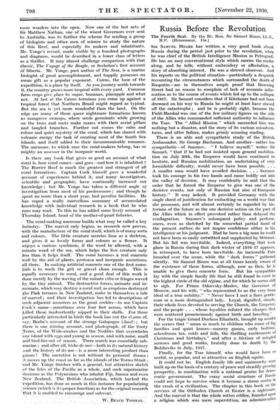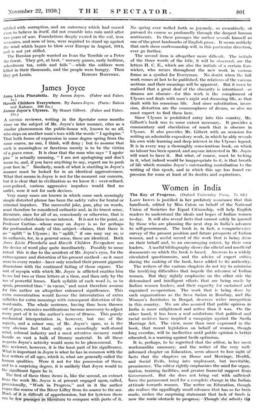The Fourth Seal. By the Rh Hon. Sir Simuel Hoare,
LL.D., M.P. (Heiriomann. 15s.)
SIR SAMUEL HOARE has written a very good book about Russia during the period just prior to the revolution, when
he was chief of the British Intelligence Mission in Petrograd. He has an easy conversational style which carries the reader along, and he tells, without embroidery or affectation, a story of absorbing interest. He was a shrewd observer. And his reports on the political situation—particularly a despatch recounting the circumstances which surrounded the death of Rasputin—are in themselves ample proof that Downing Street had no reason to complain of lack of accurate infor- mation as to the course of events which led up to the collapse of 1917. Sir Samuel considers that if Kitchener had not been drowned on his way to Russia he might at least have staved off the catastrophe ; and he is probably right, because the Field-Marshal was one of the few military figures on the side of the Allies who commanded sufficient authority to influence the Tsar. The " Allied Mission " which succeeded him was nothing but a disaster, and the story of its various misadven. tures, and utter failure, makes grimly amusing reading. There is an able and sympathetic study of the British Ambassador, Sir George Buchanan. And another—rather too sympathetic—of Sazonov. " I believe myself," writes Sir Samuel, " that if he had not insisted upon general mobilize. tion on July 80th, the Emperor would have continued to hesitate, and Russian mobilization, an undertaking of very formidable difficulty, would never have been possible. . . . A smaller man would have avoided decision. . . . Sazonov took his courage in his two hands and came boldly out into the valley of decision. It may confidently be said that the order that he forced the Emperor to give was one of the decisive events, not only of Russian but also of European history." It may indeed. It provided Germany with the single shred of justification for embarking on a world war that she possesses, and will almost certainly be regarded by his- torians of the future as the one decisive action on the part of the Allies which in effect provoked rather than delayed the conflagration. Sazonov's subsequent policy and perform- ances, even as sketched by the somewhat partial hand of the present author, do not inspire confidence either in his intelligence or his judgment. Had he been a big man he could not have been so easily outwitted and supplanted by Stiinner. But his fall was inevitable. Indeed, everything that took place in Russia during that dark winter of 1916-17 appears, in retrospect, to have been inevitable. An inexorable Fate brooded over the scene, while the dark forces " gathered silently. Sir Samuel Hoare was at all times keenly aware of the existence of these forces, although, now as then, he is unable to give them concrete form. But his sympathies lay with the simple family life that he still found to exist in the highest circle of the old regime, and for which he seems still to sigh. For Prince Odoevsky-Maslov, the Governor of Moscow, and his wife, " who represented to us the very beau ideal of a true nobility." " Never have I met a finer gentle- man or a more distinguished lady. Loyal, dignified, simple, their whole lives devoted to serving the Church, the Emperor, and the people . . . whose loyalties refuted the charges that were scattered promiscuously against birth and breeding."
For the tragic Grand Duchess Elizabeth, brought up amidst the scenes that " mean so much to children who come of big families and quiet homes—nursery games, early bedtime, schoolroom tea, colds and falls, the thrilling excitements of Christmas and birthdays," and after a lifetime of mingled sorrows and good works, brutally done to death by the Bolsheviks in. July, 1917.
. Finally, for the Tsar himself, who would have been 50 useful, so popular, and so attractive an English squire.
It could not be. English family life and squirearchy were •
built up on the basis of a century of peace and steadily growing prosperity, in combination with a national genius for demo- cratic government. The crazy social structure of Russia could not hope to survive when it became a storm centre in the crash of a civilization. The chapter in this book on the services of the Orthodox Church at Easter is a nightmare. • And the marvel is that the whole rotten edifice, founded upon a religion which was mere superstition; an administration riddled with corruption, and an autocracy which had ceased even to believe in itself, did not crumble into ruin until after two years of war. Foundations deeply rooted in the soil, iron treasures, and men-of iron, were required to stand up against the wind which began to blow over Europe in August, 1914, and is not yet stilled.
The Russian people wanted an Ivan the Terrible or a Peter the Great. They got, at best, " nursery games, early bedtime, schoolroom tea, colds and falls "—while the soldiers were killed in their thousands, and the people were hungry. Then



















































































 Previous page
Previous page